新概念英语青少版4aunit1
新概念4A Unit 1

be angry with sb. 对某人感到生气
A young man and a young woman were sitting behind me. They were talking loudly. I got very angry. I could not hear the actors.
Last week, I went to the theatre. I had a very good seat. The play was very interesting. I didn’t enjoy it.
• • • •
I didn’t enjoy it. enjoy: enjoy oneself 玩得开心 enjoy+ sth. : 喜欢,从当中得到一种享受 I like something very much./I love something. • I enjoy the class. ∕I enjoy the music. ∕I enjoy the book. • enjoy the dinner/film/program/game
13.The little boy ate an apple greedily in the kitchen this morning. 14. She draws beautifully. 15. I like music very much. 16. They built a new school in our village last year. 17. The math ended at four o’clock. 18. She received a letter from her brother last week.
attention n. 注意
新概念青少版4A第一单元JNCE-Unit1 A private conversation
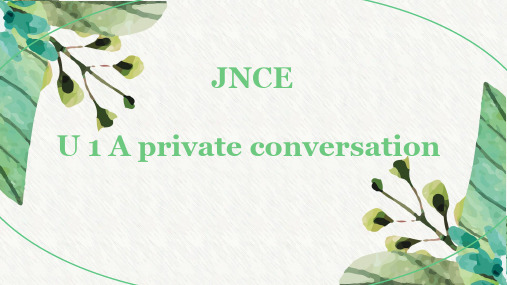
1. should we listen carefully and
pay attention to the speaker?
注意,关注
转身
2. could we turn round and
speak loudly to the other persons?
Dos and Don’ts
If others ask you some private questions, and you don’t want to answer it, 1. would we say “sorry” politely or would we say “No” rudely?
Fill in the blanks
1. Her questions about my p_r_i_v_a_t_e_life made me angry. 2. It is a pleasure to do _b_u_s_i_n_e_ss_(生意) with you. 3. It’s r_u_d_e_to speak when you are eating. 4. The teacher told the students to pay a_tt_e_n_t_io_n__to his spelling. 5. I had a long __c_o_n_v_e_r_s_a_t_io_n_(谈话)with her the other day. 6. She couldn’t b_e_a_r_the thought of losing him.
What are the private conversations in the Western country? 4. conversation: talk, chat 5. polite / impolite / rude adj.
新概念青少版4a.
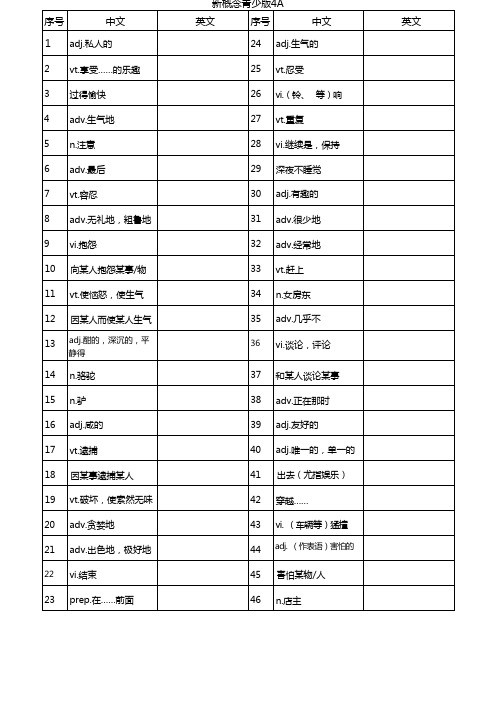
218
vt.练习,训练
243
n.笔记本电脑
219
n.太极
244
adv.罢工
220
n.乡下
245
增长
221
n.钓鱼,捕鱼
246
adv.再一次
序号
中文
英文
序号
中文
英文
247
n.船长
258
adj.有能力的
248
出发
259
有能力做某事
249
n.港口
260
创造…建立…
250
出发
261
vt.演出
251
大量的
108
adj.橙色的
133
n.青少年
109
adj.长大的
134
n.酒吧小酒店
110
vt.假装
135
n.店主
111
n.管弦乐队
136
n.贝壳
112
adj.现场直播的
137
天啊
113
vt.排练
138
n.别墅
114
进城
139
n.学位
115
vt.怀疑
140
n.文凭学位证书
116
去看病
141
n.毕加索
117
vt.搜查
同样地
194
vi.道歉
170
adv.悲哀地 丧气的
195
为某事向某人道歉
171
adj.失望的
196
vi.猛冲
序号
中文
英文
序号
中文
英文
197
adj.兴奋的
212
n.大量
新概念青少版4A-lesson1

Guided Conversation
4.Guided summary .Write a complete sentence in answer to each question,to make a paragragh of not more than 55words.
5.Talk about you. 1)When did you last go to the theatre/cinema?What was the show? 2)When did you last get angry?Did you complain?What happened? 3)Do you often get angry? What kinds of things annoy(骚扰)you?Do you usually complain ,or do you keep quite?
A young man and a young woman were sitting behind me. They were talking loudly. I got very angry. I could not hear the actors.
loudly 大声地
Listening and understanding
cinema
Listening and understanding
Answer the question:
Why did the wri来自er complain to the people behind him? (抱怨)
Listening and understanding
4
3
1
Listening and understanding
turn round 转身 angry生气的 angrily生气地 pay attention 专心 bear 承受
新概念英语青少版4A Unit 1ppt课件
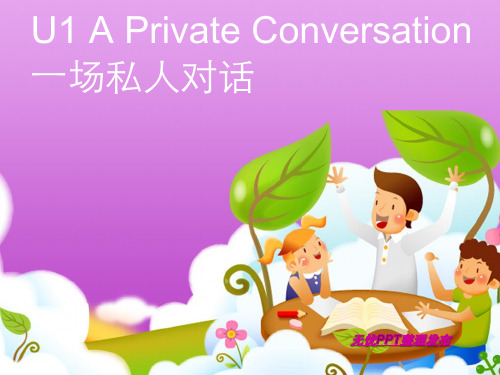
Pattern Practice
walk across the stage 穿过舞台
Page 11
Pattern Practice
behave at the theatre 剧院中的行为表现
Page 12
Pattern Practice
drive through the park 驾驶通过公园
6. i) Did you turn round? ii) What did you do?
7. i) Did you look at the man and the woman angrily?
ii) How did you look at the man and the woman?
Page 9
Page 8
Guided Conversation
4. i) Were they talking loudly? ii) How were they talking?
5. i) Could you not hear the actors? ii) Who could not hear the actors?
Page 2
Listening and Understanding
Last week I went to the theatre. I had a very good seat. The play was very interesting. I did not enjoy it.
3
Listening and Understanding
5
Listening and Understanding
‘It’s none of your business,’ the young man said rudely. ‘This is a private conversation!’
新概念青少版4a单词表
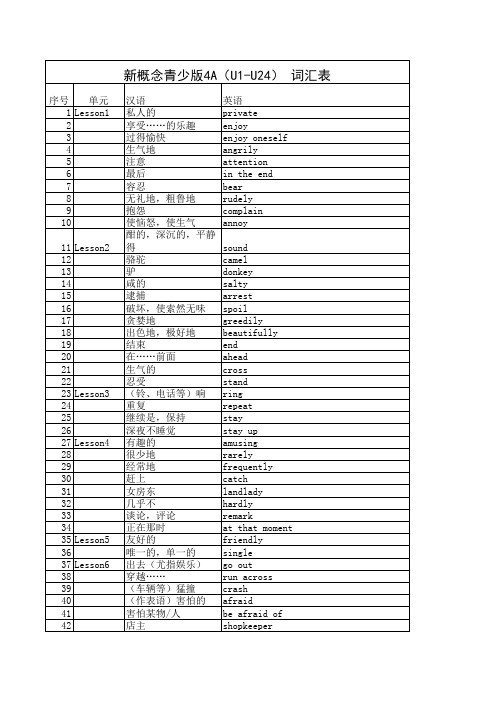
307
乘客
passenger
308
回答,做出反应
respond
309 lesson29 精神紧张的
nervous
310
从…抬头看
look up from sth
311
负担得起
afford
312
压力
pressure
313
面临压力
unter pressure
value
146
抢劫
rob
147
抢劫某人的某物
rob sb of sth
148 lesson15 使参加
enter
149
为…报名参加…
enter sb for sth
150
整齐的,整洁的
neat
151
小路,小径
path
152
孔子
Confucius
153 lesson16 相貌好看的
good-looking
249
演出
perform
250
对…实行,在…表演 perform sth.on sb/sth
251
缺席的,不在的
absent
252
缺席某事
absent form
253
创造
create
254
航行
voyage
255
发生
take placeΒιβλιοθήκη 256海洋ocean
257 lesson25 小组,团体
group
参加…
take part in sth
241 lesson24 行李
luggage
242
喂养
feed
243
新概念英语青少版1A-Unit4
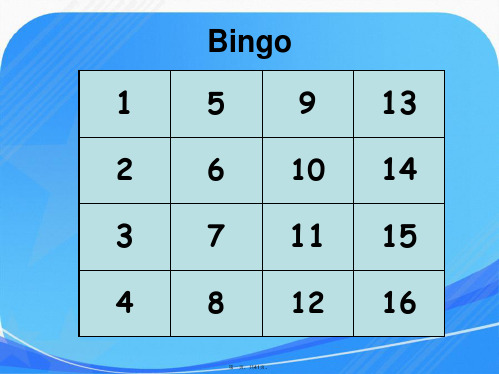
第四页,共41页。
thirsty
Is she thirsty?
not hungry
Yes, she is.
第五页,共41页。
well not ill
Is she ill?
No, she isn’t. She is well.
第六页,共41页。
If you are thirsty(渴),drink some water. If you are________,______________.
If you are__h_u_n_g_ry__,___ea_t_s_o_m_e_f_o_od___.
If you are________,______________.
If you are________,______________.
第十六页,共41页。
Game2:Make more sentences造句大比拼
If you are sick, go to the hospital. If you are thirsty(渴),drink some water. If you are________,______________. If you are________,______________. If you are________,______________. If you are________,______________.
If you are________,______________.
If you are________,______________. If you are____h_o_t __,______________.
新概念英语青少版4A Unit 1电子教案

Listening and Understanding
Last week I went to the theatre. I had a very good seat. The play was very interesting. I did not enjoy it.
Listening and Understanding
A young man and a young woman were sitting behind me. They were talking loudly. I got very angry. I could not hear the actors.
Listening and Understanding
7. i) Did you look at the man and the woman angrily?
ii) How did you look at the man and the woman?
Guided Conversation
4. Guided summary.
The write went to the theatre last week. He did not enjoy the play. A young man and a young woman were sitting behind him. They were talking loudly. The writer could not hear the actors. He turned around. ‘I can’t hear a word!’ he said. ‘This is a private conversation!’ the young man said.
青少版新概念教案4A.1

新概念英语4A备课教案周次第一次8月25日主题Unit 1 A private conversation教学目标1.学习掌握课文中发生在电影院的故事;2.复习使用一般过去时;3.学习正确的英语语音语调。
教学内容1. 单词: 电影院里的相关单词;2. 语法:一般过去时与一般现在时;3. 英语简单句的结构;Key words: theatre; interesting; enjoy; angry; turn round; pay attention; bear; none of your business Grammar: simple statements(Basic Sentence Patterns):1)主+ 动(SV)eg:I work.2)主+ 系+ 表(SVP)eg:John is busy.3)主+ 动+ 宾(SVO)eg:She studies English.4)主+ 动+ 宾+ 补(SVOC)eg:Time would prove me right.5)主+ 动+ 间宾+ 直宾(SVOiOd)eg:My mother made me a new dress.教学过程一.Warm-up questions :Do you often go to the cinema ? Why ? Which cinema do you like to go ?Today we are going to learn a story happened in cinema.二.New knowledge:1.Ask two questions to attract students’attention to the topicWhy is it a private conversation ?Why did the writer complain to the people behind him ?2.Let students dragon to read the passage and underline the new words while reading.Teacher write down the new words on board and ask students to guess the meaning according to the context. For some words, teacher will add English explanations.pare the result with New words and expressions4.Teacher leads the students to read the new words.5.Ask students to make sentences with the new words.6.Retell story with giving clues writing by teacher on board.Last week –theatre –seat—interesting—enjoy—young man and young woman—behind—loudly—angry—actors--looked tangrily—attention—bear—turned round again—said angrily—said rudely—private conversation7.Grammar teaching8.Finish the practice三.Finished:9.Homework: vocabulary, text,and grammar (3 sides)。
新概念英语青少版4AUnit1
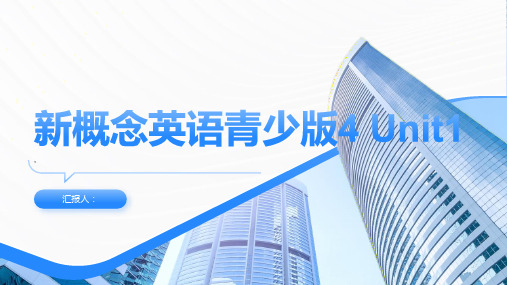
购物英语:在商店、超市等 场合使用
旅游英语:介绍旅游景点、 酒店、交通等
餐厅英语:点餐、用餐、结 账等场合使用
日常交际:问候、介绍、告 别等场合使用
培养跨文化交流意识
培养自主学习和合作学习能 力
教学方法:任务型教学法通过完成实际任务来学习英语 教学手段:利用多媒体资源如PPT、视频等辅助教学 课堂活动:组织学生进行角色扮演、小组讨论等活动提高口语和听力能力 教师指导:教师提供指导和反馈帮助学生纠正发音和语法错误
,
汇报人:
目录
CONTENTS
适合年龄:适合10-15岁的青少年 适合英语水平:适合英语基础较好的学生 适合学习目标:适合想要提高英语听说读写能力的学生 适合学习方式:适合通过系统学习教材和练习册的学生
针对青少年的学习需求设计内容生动有趣激发学习兴趣。 注重听、说、读、写全面发展提高英语综合能力。 配有丰富的练习和活动帮助巩固所学知识。 教材难度适中逐步提高英语水平。
教师水平:教师教学经验丰 富能够很好地引导学生进行
学习
课堂氛围:课堂氛围活跃学 生参与度高
练习目的:提高英语听说能 力培养语感和语音、语调
练习内容:模仿课文录音进 行跟读和角色扮演
练习方式:个人或小组合作 完成教师给予指导和反馈
练习素材:新概念英语青少 版4 Unit1的课文录音和配
套图片
朗读课文注意语音语调 默写单词和句子巩固记忆 阅读理解练习提高阅读能力和技巧 写作练习培养写作技巧和表达能力
上课时间:每周 一至周五每天2 小时
课程内容:学习 新概念英语青少 版4 Unit1的词 汇、语法和阅读 等
教学方法:采用 讲解、练习和互 动等多种方式注 重实际应用和口 语训练
